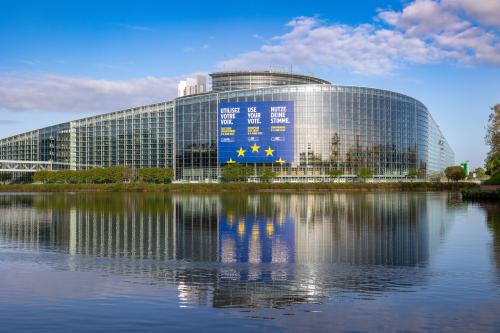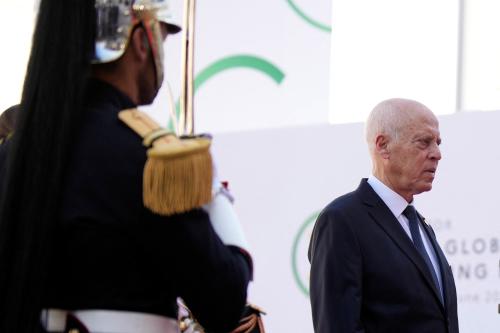A decade ago, the European immigration crisis and the U.K. decision to leave the European Union foreshadowed the stunning outcome of the 2016 U.S. presidential election. The mixed results of the recent EU parliamentary elections offer ambiguous but still significant lessons for both U.S. political parties as the 2024 presidential election approaches.
Although the recent EU elections did not produce the overall right-wing shift that many commentators expected, the story was different in the EU’s three largest members—Germany, France, and Italy—which contain nearly half the Union’s total population and generate more than half its GDP.
The results were most dramatic in France, where Marine Le Pen’s right-wing populist National Rally received 31.4% of the popular vote, more than twice the centrist slate of candidates, and earned 30 seats in the EU Parliament, up from 18 in the previous election.1 In response, President Emmanuel Macron called for surprise French parliamentary elections at the end of June and beginning of July, whose results could yield France’s first far-right prime minister since the 1930s.
Macron’s decision has thrown French politics into turmoil. While the Left quickly formed a united front to wage its election campaign, the smaller parties on the Right are internally divided. Éric Ciotti, the president of the traditional conservative Républicains, secretly negotiated an electoral alliance with the National Rally. The move that led to his expulsion from the party, though a court overturned it on Saturday, leading to more chaos. A bitter split erupted within the Reconquête party founded by far-right television commentator Éric Zemmour when its star candidate, who happens to be Marine Le Pen’s niece, broke with Zemmour and urged party members to vote for a coalition led by the National Rally. Meanwhile, some in Macron’s own party are openly disagreeing with his call for early elections. Initial polling indicates that his gamble may fail: The National Rally has been running first, with the broad left Popular Front coalition a close second—and Macron’s centrists trailing well behind in third place.
In Germany, the EU’s largest member, the election results boosted the far right AfD into second place among the country’s parties, with 16%, even though one of its top candidates defended some members of the SS during the campaign.2 The opposition Christian Democrats led the way with 30% of the vote. As our Brookings colleague Constanze Stelzenmueller has pointed out, this strengthened the center ground in the EU parliament and increased the likelihood that Ursula von der Leyen would win a second term as president of the European Commission. The three parties that make up the government coalition—the Social Democrats, Greens, and liberal Free Democrats—suffered a sharp rebuke, receiving a combined total of just 31% of the popular vote, which cut their representation in the European Parliament from 42 to 31 seats.3 At just under 14% of the vote, the Social Democrats hit a low point in postwar history.
Italy presents a different case because the far-right Brothers of Italy are already the largest party in the governing coalition and the party’s leader, Giorgia Meloni, serves as prime minister. Still, the EU elections results put an exclamation point on her party’s dominant position. The popular vote for the Brothers of Italy surged to nearly 29% of the total, exceeding the 26% it received in the 2022 Italian parliamentary election, and the party’s seats in the European Parliament more than doubled from 10 to 24. Since becoming prime minister, Ms. Meloni has impressed other European leaders with her deft international diplomacy even as her party has implemented far right domestic policies. Her performance may help persuade voters in other EU countries that the populist right, long regarded as extreme and irresponsible, can be trusted to govern well. But liberal and center-left parties continue to insist that the center-based alliance in Brussels resist any deals with Meloni in the European Parliament.
The far-right gains show that issues at play in the U.S. election that favor Donald Trump, immigration and crime above all, continue to resonate in Europe. The hard right parties, like Trump, continue to appeal in declining industrial towns and rural areas whose economies have lagged behind the prosperous Metropolitan areas. (The far right did exceptionally badly in Paris, for example.) The strength of the extreme right among younger voters is a signal to watch. And while the results are by no means uniform, incumbent center-left and liberal parties—again, Germany and France are especially important here—were punished by voters, not a good omen for President Biden.
Yet, right-wing victories were not the whole story when all the ballots cast in the EU’s 27 nations were counted, and Biden can take heart that voters overwhelmingly chose mainstream political parties and rejected the extreme right. The center was challenged, but it held.
The coalition of center-right, center-left and liberal parties that effectively controlled the European Parliament fell from 59% of seats to 56%, still a solid majority. If members of Green parties are added to this group, the proportion of mainstream members rises to 64%. As of the latest counts, the center-right gained 14 seats for a total of 190; the center-left lost three, for 136; and the liberal parties lost 22, to 80 seats. Nearly half of the liberal losses came in Macron’s rout in France.
It was a very difficult election for the Greens, who emerged with 52 seats, down from 71. They suffered partly because they had done so well in the last election (they had a lot of seats to lose), but also because of intense opposition among certain groups (farmers and rural voters in particular) to strong measures against climate change. (Center parties further chipped away at the Green vote by campaigning on the climate issue, too.) Supporters of climate action in the United States can usefully study the European Green experience as an alert to the potential for backlash.
At the same time, Hungary’s strongman Viktor Orbán—one of the leading lights of the new Far Right and a hero to many Trump supporters—saw his Fidesz party turn in its worst performance in an EU election since Hungary joined the European Union two decades ago. Similarly in Poland, the populist right Law and Justice party, which lost power nationally last October, suffered another setback.
The center-left and the Greens posted strong showings in several nations—and in many of them, the far-right lost ground, or fell below expectations. This was the case in the traditional social democratic heartland in Scandinavia—in Sweden, Finland, and Denmark. In the Netherlands, the coalition of the Labor Party and the Greens ran ahead of Geert Wilders’ far right party that came in first in last November’s general election. Far-right parties in Spain and Portugal also performed below expectations, and behind earlier high scores.
The lessons of these elections for the U.S. are as ambiguous as their results. European Union elections are in any event not always a good guide to the future—even Europe’s—since they give voters something close to a free vote. They can cast ballots in protest without any consequences for the compositions of their national governments. Macron’s risky call for new parliamentary elections is based in part on a calculation that even voters who backed Le Pen’s party in the EU contest will be reluctant to grant it actual power at home.
If Trump supporters will cheer on the gains by the only section of European opinion with any sympathy for the former president, Biden can take heart in a majority that voted for parties that support priorities and policies far closer to his than to Trump’s. In particular, the cause of supporting Ukraine emerged as far more as a plus than a minus in these elections, as even Meloni’s victory showed. Within the Italian right, her party gained ground relative to her coalition partners with far softer stances toward Russia.
The European elections were thus a warning to the mainstream, not a defeat. But it is a warning that should be taken seriously on both sides of the Atlantic.
-
Footnotes
- For insightful analysis of these results, see Tara Varma, Center on the United States and Europe, Brookings, The European Parliament elections have upended French politics | Brookings
- SS is short for Schutzstaffel–the elite guard of the Nazi regime.
- For an in-depth analysis of the election results and their consequences for Germany and Europe, see Constanze Stelzenmueller, Center on the United States and Europe, Stability for Europe, tensions at home: Germany’s paradoxical European Parliament vote | Brookings











Commentary
Did the EU voting provide any clues for the coming US election?
June 18, 2024